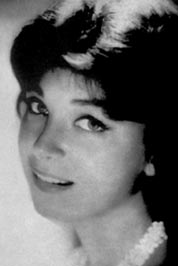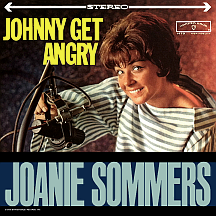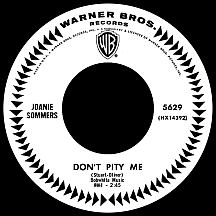JOANIE SOMMERS
Johnny Get Angry
The 1962 hit "Johnny Get Angry" is unique, as teen-oriented songs go. It was also outside the bounds of the type of material its singer, the versatile Joanie Sommers, usually attempted. Its ominous sound and downbeat lyrics ('...You stood there and hung your head...made me wish that I were dead') seemed to originate from the point of view of a spoiled teenage prima donna accustomed to being the center of attention and prone to making demands. 'Give me the biggest lecture I ever had!' would invariably cause her to stomp her feet and throw a tantrum if actually given such a talking-to. Joanie was actually 21 when she recorded the song, considerably more mature and experienced than the character she played, but her astoundingly distinct voice adds to the recording's singularity. Then there's the instrumental break...played on the kazoo! It was one of those rare instances of a record that used the vibrating device (a cousin of the simple comb-and-paper music-maker); several songs qualify for inclusion on the list of "Greatest Kazoo Hits" and Joanie's "Johnny" is arguably the most notorious.
Long before all this creative madness took place, Joan Drost was born in Buffalo, New York, and took to singing early, first in church choirs and later in a series of talent contests. Her family moved to Venice, the California beach community a stone's throw from the bright lights of Hollywood. She often sang at Venice High School sock hops; in 1959 she was introduced to bandleader Tommy Oliver, who helped get her in the door at Warner Bros. Records, established the previous year for, among other things, the purpose of promoting its stable of young TV stars-turned-singers...or vice-versa. Under her new Joanie Sommers moniker she appeared with an album, Positively the Most!, that introduced her as an 18-year-old singer of pop standards. Yet Warner wasn't entirely sure what to do with her, noting the dynamic quality of her singing and seeking to reach an audience with any, or preferably all, age groups.
They teamed her with Edd Byrnes, the 77 Sunset Strip actor who had become an unexpected teen idol with his hit "Kookie, Kookie (Lend Me Your Comb)," featuring another young Warner discovery, Connie Stevens, who promptly moved up within the company to bigger things (including solo recordings and a starring role in TV's Hawaiian Eye). "Kookie's Love Song (While Dancing)" left the singing to The Mary Kaye Trio, another WB act; Joanie's role on the novelty disc was strictly spoken, asking questions like "Kookie, am I ginchy?" and declaring "I've lost my heart and comb to you." Her contribution to this non-hit was not for naught, as it led to a singing appearance for Joanie in a January 1960 episode of 77 Sunset Strip, followed by an acting role in another episode of the series the following month.
As with Stevens, Warner Bros. put her to work with Sunset Strip composer and arranger Don Ralke, resulting in a minor hit single. "One Boy," composed by Charles Strouse and Lee Adams and originally performed by Chita Rivera and other members of the cast of the popular Broadway musical Bye Bye Birdie (which eventually won four Tony Awards including Best Musical), was an ideal vehicle for Joanie's youthful vocal style. One line stands out: 'One boy to laugh with, to joke with, have Coke with...' Partly it was because, at the time, commercial products were seldom mentioned in hit songs, but there's another significance to that line when put in context with later developments.
Grammy voters, suitably impressed with Joanie's combination of talent and song choices, nominated her in early '61 for Best New Artist in genre-crossing competition with opera singer Leontyne Price and another WB act, comedian Bob Newhart, the subsequent winner. Another album of pop standards bestowed an ambitious nickname upon her: The Voice of the Sixties! featured "arrangements custom designed" by jazzman and future "Batman Theme" composer and unassuming geek idol Neal Hefti. Management booked her into nightclubs from coast to coast and she appeared on TV variety shows including The Tonight Show with Jack Paar, The Dick Clark Show, The Bob Hope Show and a variety special starring Bobby Darin. Her first theatrical film, Everything's Ducky, starring Mickey Rooney, Buddy Hackett and a talking duck, offered Joanie another acting opportunity.
Then came "Johnny Get Angry," the huge hit written by Sherman Edwards and Hal David and one of the two pop culture benchmarks she'll always be remembered for. With its shuffling beat, tinkling piano, anguished vocal ('I want a brave man, I want a cave man!') and kazoo wonderment midway, the song caught on quickly after hitting the charts in May '62, a top ten hit by early July, crossing paths that summer with another top ten kazoo smash, Dion's "Little Diane." An answer record, "Joanie Don't Be Angry" by teen singer Vinnie Monte (doing an anemic Gene Pitney imitation), was hastily released but bore no resemblance to Joanie's hit single; Monte's career went unfulfilled despite many releases on more labels than even he could keep track of.

The next twist in Sommers' career was an unexpected goldmine for the hitherto two-hit wonder. Pepsi Cola created a clever new ad campaign suggesting anyone who partook of their tasty beverage had become a part of the youthful "Pepsi Generation!" Joanie had to leave any Coke-swigging tendencies behind in 1962 when she was hired to sing all the TV and radio commercials for the number two soft drink ('Pepsi - For Those Who Think Young!' was strangely set to the tune of "Makin' Whoopee," a song rooted in a much older generation). The campaign went through variations ('Come Alive!') and for many years afterwards, hers was the voice you heard on those ever-present, slicky-produced spots, suggesting the "Voice of the Sixties" tag wasn't such a far-fetched idea after all. Warners emphasized her teen appeal for quite some time; "When the Boys Get Together," a yearning Edwards-David ballad with a reference to the previous single ('Oh, Johnny, I love you so much!') spent a few weeks near the bottom of the charts in October, but follow-ups like "Bobby's Hobbies" and "When Randy Moved Away" arrived D.O.A. "Little Girl Bad" was a teen-angst treat, but by the summer of '63 she was ready to go in a new direction.
More high-profile TV appearances followed, including a bizarre once-in-a-lifetime turn on The Jack Benny Show where she took part in a skit with the creepiest of all thespian legends, Peter Lorre. A diverse schedule the next couple of years included more acting assignments (on the small screen in Burke's Law and in theaters playing Doug McClure's love interest in the drag race epic The Lively Set). Her 1964 bossa nova album Softly, the Brazilian Sound with acclaimed São Paulo-born guitarist Laurindo Almeida met with positive reviews but sold below expectations. Last shot with WB?: "Don't Pity Me," a Brill Building-esque tune written by Jerry Stuart and Tommy Oliver, released in the spring of 1965. A performance of the song on Hullabaloo, a late-inning push by Warner's promotion staff, some final goodbyes and Joanie was off the label ("Don't Pity Me," by the way, deserved some measure of success; it has since been discovered by and become an obsession with record collectors). She popped up on the Columbia label in 1966 and made a nice showing in the top ten of the Easy Listening chart with "Alfie," though Cher's original from the film stole her glory and Dionne Warwick's version several months later trumped them both.
An ABC Stage '67 presentation titled On the Flip Side aired in December '66 and featured music by Burt Bacharach and Hal David, pairing Sommers with Rick Nelson for one song, "Try to See it My Way." She lent her voice talent to Mouse on the Mayflower, a Thanksgiving '68 animated TV movie from Rankin/Bass Productions; at about the same time her "big return" to Warner Bros. resulted in just one single, "Talk Until Daylight," which received a smattering of airplay in early 1969. More television roles and animation work followed as she stayed on good terms with the Pepsi people, hawking Diet Pepsi in the '70s and '80s. Joanie Sommers has continued performing for audiences and embraces the kitsch of her greatest hit, "Johnny Get Angry," remaining faithful to the song's arrangement, kazoo break and all.



